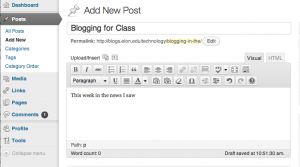The student perspective: Blogs in the classroom
As the world of technology grows, faculty members learn to utilize these advancements in their
classroom, but it begs the question: how do the students feel about blogs in their curriculum? In a previous post, Teaching and Learning Technologies highlighted how the faculty is using blogs in their classrooms, and how those blogs contribute to their teaching experience. Now, we hear from their students to see if they agree that blogging is a practical, real-world assignment.
MORE: Read about Elon Faculty using blogging assignments
Benefits to blogging: Boost your online presence
In Beth McAlhaney’s New Product Marketing and Branding class, the students, most of whom were seniors, embraced blogging as a part of class discussion. They also viewed it as a resume builder that could set them apart in the job market. Caroline Scalici, a student in McAlhaney’s class, has already seen the benefits of having a blog in a professional setting.
“Blogs ensure that students do research and reading to keep up with the subject,” Scalici said. “It also adds to their portfolio and is great leverage during the career search. I even had one agency (my dream company) email me back just because they saw my blog in the signature of my email and sent one of my articles out to everyone in their branch.”
Scalici’s classmate, Emma Price, also agreed that having a blog on a resume, especially one related to your field of study, is crucial to getting a leg up in the job market.
“I believe that it acts as a ‘point of differentiation’ between me and other job candidates that I have a database of my opinions about happenings in the marketing industry,” Price said. “It shows that I not only care about the area in which I hope to get a job but also shows that I can think critically about real-world relevant issues.”
Benefits to blogging: Learning business communications
Students in Scott Buechler’s Business Communications class used blogs in an interactive way by choosing a company to hypothetically work for and writing posts based on their employee persona. They studied videos, read articles, and posted to the blog as if they were informing company interns about the latest news. Anna Kuertz, one of Buechler’s students, thought that blogging was a more interesting and relevant way to learn about the subject.
“The best thing about blogs in class [is] that they are fun and different from traditional course work,” Kuertz said. “It has exposed me to another form of business communication that is becoming more and more prevalent in today’s world.”
Because blogging is prominent in the business and marketing fields, it is an important tool for students to learn about when they study business communications. Richard Segal, another student in Buechler’s class, believes that blogging also improved the way he and his fellow classmates worked as students.
“I think classrooms benefit by holding students accountable, not only to your teacher but also to your fellow classmates,” Segal said. “I do not want to submit a sub par blog post if the entire class will see it.”
Concerns about blogging
It is important to remember, however, that a platform as current as blogging does not come without its problems. Students stressed the importance of relevancy and engagement with these blogs. They want the posts to relate to what they’re learning about, and they want to incorporate their online thoughts into class discussion.
Blogs are a good fit for Buechler and McAlhaney’s courses but they may not be appropriate for every course. Student Emma Price expressed the concerns over the possibility that too many classrooms might require blogging for homework assignments.
“I feel that I would get frustrated if I was charged with keeping a blog in a class in which I had very little interest and was taking only to get a requirement out of the way,” Price said. “Yet, with that being said, I think that it’s always possible to tie what you learn in class to your personal area of interest and perhaps, it would allow for ‘connections’ that wouldn’t normally be made to happen.”
Like with any technology, students need to buy-in to and understand the purpose of the blog. Otherwise, the blog’s intended benefits will get lost among in the sea of a student’s assignments and deadlines.
Interested in blogging?
If you are interested in using blogs in your teaching and want some assistance, you can read our post on getting started with blogs, or contact Teaching and Learning Technologies at 336.278.5006 or tlt@elon.edu.
 Follow
Follow

